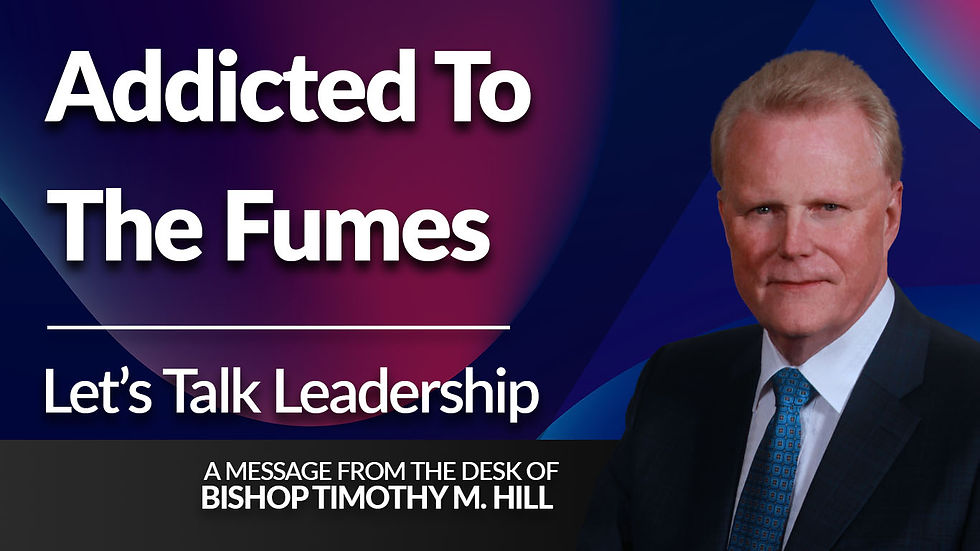Owning Your Decisions
- Tim Hill

- Nov 20, 2025
- 3 min read

Leadership isn’t about having a title, a platform, or applause. It’s about the willingness to take responsibility for the decisions you make and the direction you choose — even when the room grows quiet, the support thins out, and the criticism gets loud.
There will be moments when you’re misunderstood, misquoted, or misrepresented. And you will be surprised at how quickly people disappear when the arrows start flying. Not because they don’t care about you, but because they don’t want to get hit with the same arrows aimed at you. That’s where true leadership begins — in the lonely places where you must own your choices with courage and conviction.
Sometimes you have to stand without applause.
Without admiration.
Without appreciation.
And sometimes, completely alone.
A Lesson From Experience
I once asked a former elected church leader, “What’s the greatest thing about being elected?”
He smiled and said, “The greatest thing about being elected… is being elected.”
I understood exactly what he meant. Leadership has blessings, yes — but it also carries long nights, tough calls, and the weight of decisions that can’t please everyone. Titles shine from a distance, but up close, they weigh far more than most people realize.
On a leadership team I once served with, there was a lighthearted comment that surfaced whenever an unpopular decision had to be explained: “I was just one of several in the room.”
It wasn’t said with dishonesty or avoidance — just a gentle way of acknowledging shared responsibility. But over time, I learned that even in shared leadership, each person still has to carry the weight of the decision individually. You can’t hide behind the group. You still own your part in the process.
A Personal Reflection
Looking back, I’ve had seasons where decisions placed me in uncomfortable territory. Not immoral decisions — just difficult ones. Decisions that required backbone more than applause. In those moments, support could feel thin, and conversations grew quieter. People who had been talkative suddenly chose caution. I wasn’t angry — I understood. Leadership exposes you in ways others prefer to avoid.
But I also learned something:
You grow more in the moments of quiet resolve than in the moments of loud approval.
And you find your feet — your real feet — when the floor beneath you feels uneven.
The Posture Behind Decision Ownership
Before anyone can embrace the practices of responsible leadership, there has to be a shift inside the leader themselves. Ownership doesn’t begin with techniques or tactics — it begins with posture. A leader must settle, deep in their spirit, that responsibility is not something to avoid, dilute, or distribute for convenience. It is something to carry, confidently and humbly.
The Principles I Have Learned
Stand By the Decision
Once you’ve made a prayerful, thoughtful decision, stand by it. You can adjust, refine, and learn, but don’t retreat simply because pressure rises.
Accept That Criticism Is Part of the Territory
Leaders are lightning rods. If you’re waiting for universal approval before moving, you’ll never take a step.
Take Responsibility Without Excuses
Shared leadership is healthy, but shared blame is unhelpful. Own your contribution. Own your influence. Own your voice.
Expect Delayed Gratitude
Very rarely will people thank you in the moment for the hard calls. Appreciation often comes years later, if it comes at all.
Let Integrity Set the Pace
Your decisions shape your reputation far more than your intentions do. Make choices that allow you to walk in peace long after the moment passes.
Choose the Long View
Leaders who survive and flourish are those who refuse to sacrifice the future for the comfort of the present.
Now, as I Choose to close remember this:
Leadership isn’t proven in the applause — it’s proven in the aftermath.
In the silence.
In the criticism.
In the moments when you have every opportunity to pass the blame but choose instead to stand tall.
Owning your decisions doesn’t make leadership easier. It makes it meaningful.
And in the long run, it makes you the kind of leader others trust.



Comments